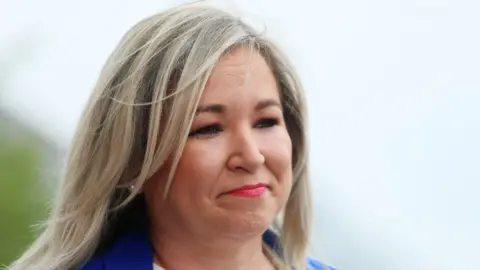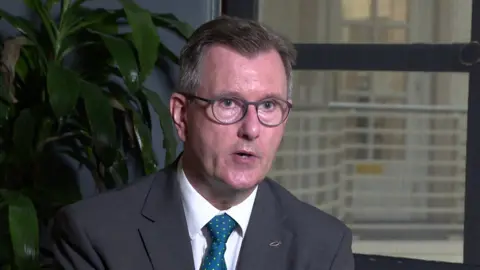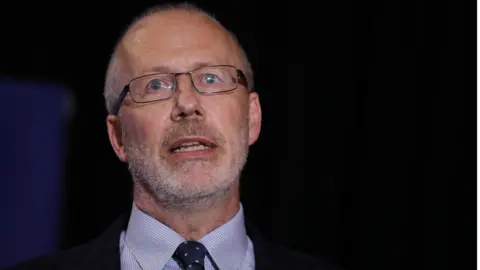Covid-19: Boris Johnson's easing plan reckless, says Michelle O'Neill
 PA Media
PA MediaBoris Johnson's plan to end Covid-19 restrictions in England is reckless, Northern Ireland's Deputy First Minister Michelle O'Neill has said.
Face masks will no longer be required and distancing rules will be scrapped, the prime minister has confirmed.
Ms O'Neill said Northern Ireland would "not be following that model".
Democratic Unionist Party (DUP) leader Sir Jeffrey Donaldson has said Northern Ireland should "move eventually" to a policy of voluntary wearing of masks.
Taoiseach (Irish Prime Minister) Micheál Martin also said he had concerns about the planned dropping of the remaining restrictions in England.
Mr Johnson said he expected his final step for restrictions in England would go ahead as planned on 19 July after a review of health data on 12 July.
Sir Jeffrey said he hoped the Stormont executive would be able to make further easements of restrictions in Northern Ireland in the weeks ahead.
However Ms O'Neill, the Sinn Féin vice-president, said she was "concerned for the people in England" because of the plan set out by the prime minister.
"In my opinion it's a reckless approach," she said.
Ms O'Neill said the Stormont executive would make its own decisions, adding that she hoped ministers could agree the next steps at their meeting on Thursday.
Allow X content?
However, she said it would not be to the same extent as England, adding that care was still needed.
Ms O'Neill said she hoped the next move by ministers would be to secure progress on previously-delayed plans for easing restrictions.
"We will probably be able to set out a direction of travel for what the next couple of months will look like but certainly it will not be everything," she said.
'Encourage continued mask-wearing'
Speaking in the Dáil (lrish parliament), Mr Martin, the taoiseach, there was a need to be "careful, particularly with what's going on in the UK at the moment".
"This idea that we can open up completely with no consequences - it's something that I would have concerns about", he said.
Sir Jeffrey said he believed that even if it becomes voluntary to wear face coverings many people may still choose to wear them when shopping or in public spaces.
"I'd certainly encourage people to continue wearing face masks and abiding by social distancing until new guidance is issued," he said.

Northern Ireland's chief scientific adviser has also warned that Stormont needed to take into account lower vaccination rates in the Republic of Ireland in any decisions around Covid restrictions.
Prof Ian Young said case numbers are increasing rapidly in Northern Ireland, mostly in the under 40s.
He said it was clear that Northern Ireland was at the outset of a "significant further wave of Covid-19".
"In Northern Ireland, out of the four UK nations, we have a particular difference in that we have a border with another country where the vaccination rate is significantly lower," said Prof Young.
"That's something that needs to be factored into decision making in Northern Ireland."
He reiterated that about 400 people with Covid-19 could be in hospital at any one time by the end of the summer.
But he said if the number of vaccinated individuals increase from the current levels of 80% to 90% by the end of the summer, inpatient numbers could be reduced by half.
'The science hasn't changed'
Prof Young said decisions about wearing face coverings in Northern Ireland would be up to ministers.
"In terms of the science it's clear - wearing face coverings in spaces that aren't well ventilated protects from infection and everyone else from infection," he said.
He said face coverings were most effective when a large proportion of people wore them in such settings.
"That's the science, it's not going to change it hasn't changed and minsters will be informed by that when deciding what's best in terms of policy in Northern Ireland.," he said.
DUP MP Sammy Wilson said he wanted to see freedoms and "joy" injected back into society.
Mr Wilson also defended referring to Health Minister Robin Swann as "Dr Doom", saying he was echoing the sentiments made by the prime minister about "doomsters".
"To me this is a choice between those who see no light at the end of the tunnel and those who want to take us out of the tunnel and into freedom," Mr Wilson said.
 PAcemaker
PAcemakerAsked whether he believed his party colleague calling Northern Ireland's health minister "Dr Doom" was appropriate, Sir Jeffrey said he believed Mr Swann had "done a good job in difficult circumstances".
"The Department of Health has faced many challenges during this pandemic, I want to commend all our health workers... most people would conclude Robin Swann has done his best," he added.
Meanwhile, a pop-up Covid-19 vaccination clinic, with no booking required will open at Whitla Hall at Queen's University Belfast on Wednesday 7 July.
The Pfizer vaccine will be available - between 10:00 BST and 18:00 - to anyone aged over 18 who has not yet had their first jab.
Vaccinators will return six weeks later to administer second doses. The initiative is being run by the Belfast Health Trust.
About 80% of the adult eligible population in Northern Ireland have so far received their first dose, and about 60% are fully vaccinated.
In the Republic of Ireland, the Health Service Executive said more than half of its eligible adult population is now fully vaccinated.
Prof Young also said some form of Covid-19 certification to show individuals have been double vaccinated was going to be of "considerable help" for international travel.
He said that people booking overseas travel were taking a risk because of rapid policy changes that take place in other countries.
"Everybody is tired of Covid, we all want to get back to life as we remember it, as normal as possible," he said.
